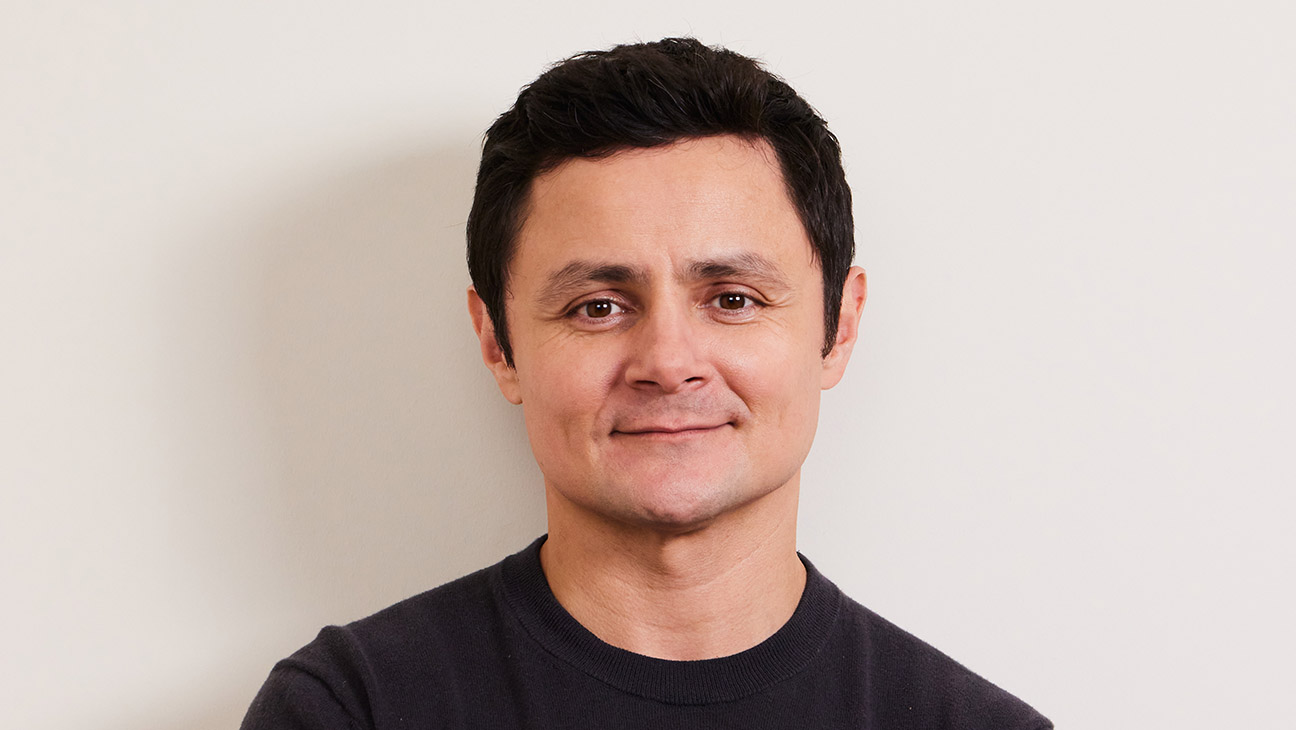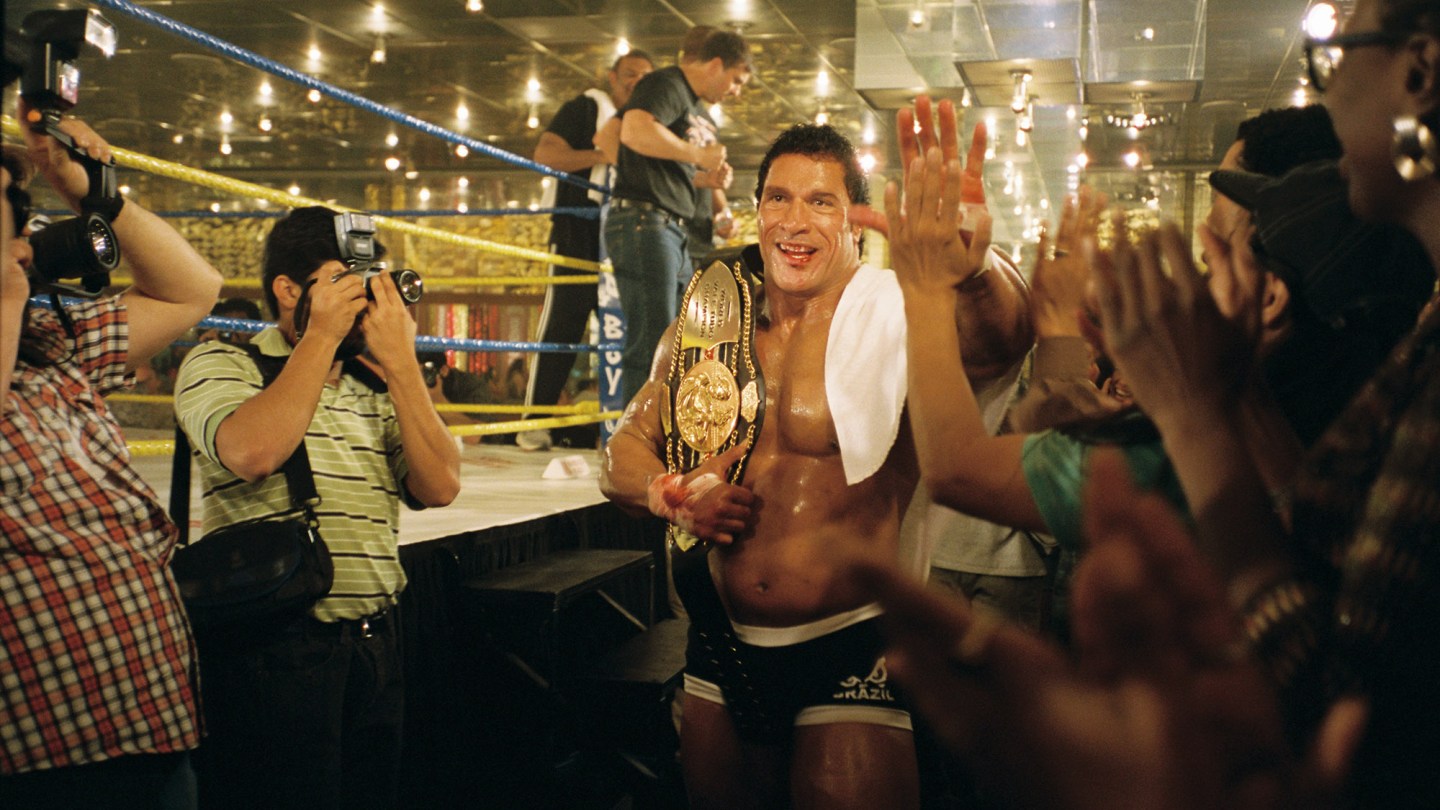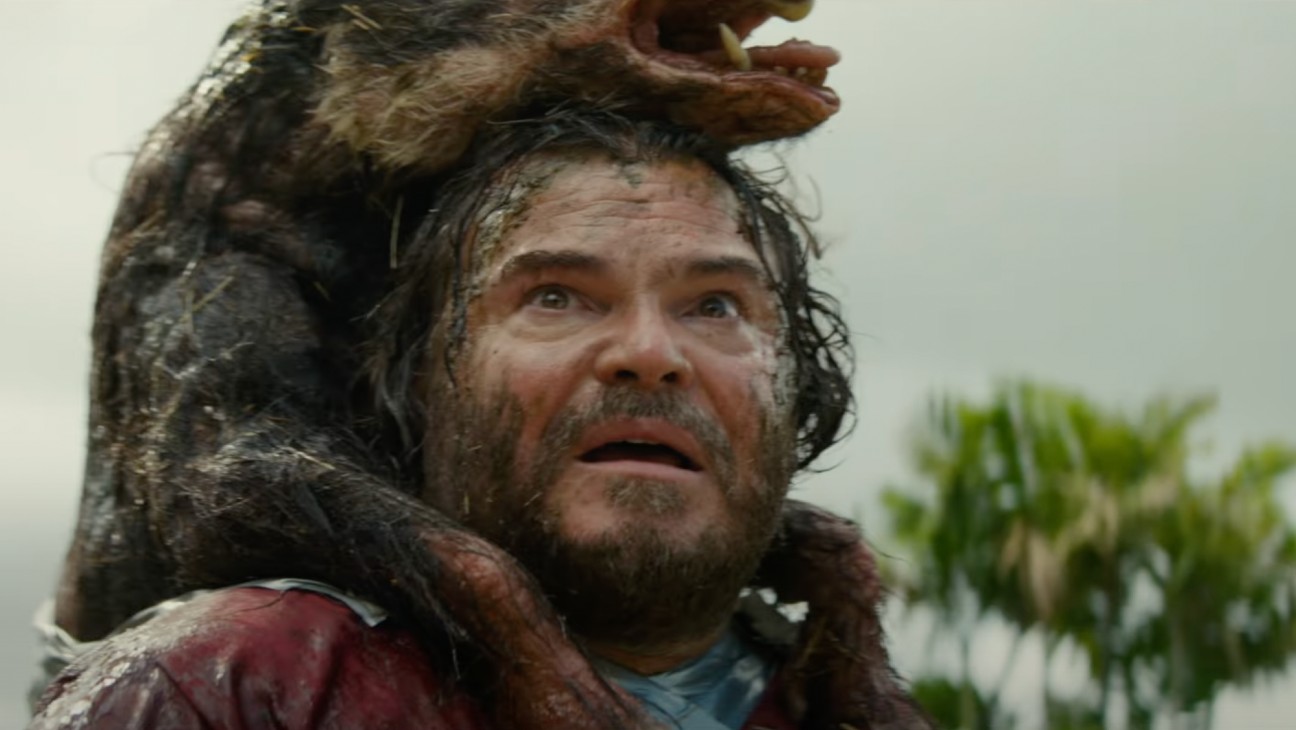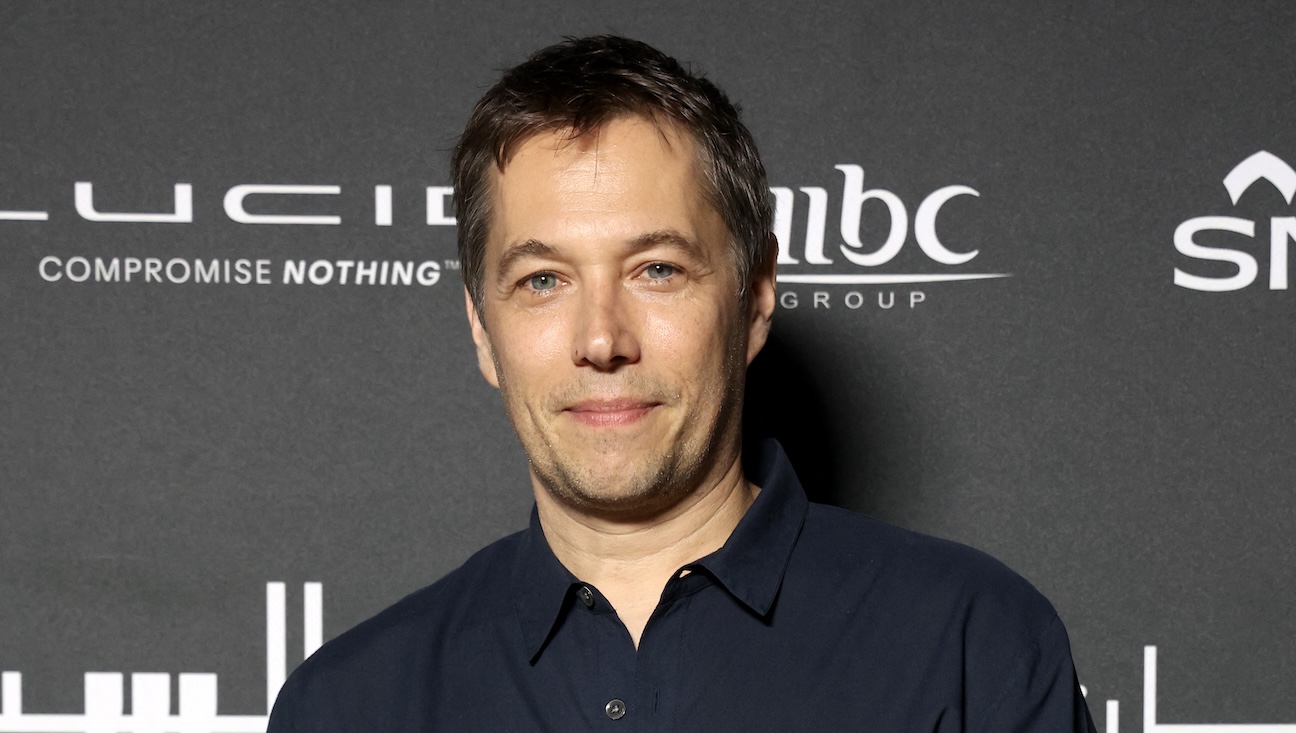Within a few minutes of meeting Arturo Castro, you can immediately tell why he’s had such a prolific career in comedy. Oddly enough, my first impression of him was for his poignant dramatic work on the under-appreciated Apple TV series, Mr. Corman, but it was comedy that opened the door to Tron: Ares in particular.
Tron: Ares’ production was waylaid by the SAG-AFTRA strike in the middle of 2023, and by the time it was finally able to launch in early 2024, post-strike schedules had shifted to such a point where certain roles needed recasting, including that of Seth Flores. He’s the playful right hand to Greta Lee’s Eve Kim, who now leads ENCOM, the tech company that was once run by Jeff Bridges’ franchise linchpin, Kevin Flynn. Fortunately for Castro, someone at the top of the Hollywood food chain was looking out for him.
Hot off the press at the time, the trailer for the Jake Gyllenhaal-led Road House reboot happened to include Castro’s candid biker gang character, Moe. His comic relief popped to such a degree that Gyllenhaal’s WME agent, Brent Morley, recommended him to his other client, Jared Leto, who serves as Tron: Ares’ title character and producer. From there, Leto threw Castro’s name into the mix for Seth and advocated for him until director Joachim Rønning and the rest of the Tron threequel’s brain trust officially cast him.
But it all started with Morley’s recommendation, and knowing that he’s an agency power player who’s day-to-day is concerned with the likes of Gyllenhaal, Keanu Reeves, Matthew McConaughey, Cailee Spaeny and Oscar Isaac, Castro is grateful for the unexpected recognition.
“[Morley] went to Jared and said, ‘Check out this trailer for Road House. I think you guys will want to see this guy.’ And it meant the world to me for various reasons. He had nothing to gain from it, honestly. I was already at William Morris, and he’s not my agent,” Castro tells The Hollywood Reporter. “But he saw somebody that worked really hard to make an impression on Road House, and he thought it was worth giving me a shot.”
The Guatemalan actor’s improvisational skills have served him well over the years, especially on his 25 episodes of Broad City. The funniest joke in Tron: Ares also originated from his off-the-cuff instincts. In an effort to give Ares (Leto’s “program” character) a more permanent and benevolent place in the real world, Eve (Lee) and Seth (Castro) need to find a code on one of Flynn’s archaic servers. So they access ENCOM’s museum-like setup of Flynn’s old-school office, and Ares quickly takes note of Flynn’s first-generation computer, which Seth refers to as a “piece of garbage.” But upon noticing that Ares doesn’t appreciate the crack, he, through Catro’s improv, adds, “That was super insensitive to your ancestors, and I’m so sorry.”
“I just couldn’t believe that line made it into the movie. Greta Lee told me ahead of time. She saw it before I did, and I was so stoked,” Castro says.
Castro is bursting at the seams with excitement over his upcoming slate, as well as his fast-approaching nuptials. He proposed to filmmaker Lauren Hoover while shooting the latest Mattel toy-based film, Matchbox, from Extraction director, Sam Hargrave. He also has a role in A Place in Hell, Chloe Domont’s next prestige thriller opposite Daisy Edgar-Jones and Michelle Williams.
“I got to have scenes with Daisy Edgar-Jones and Michelle Williams at the same time. It was an out-of-body experience, and I was like, ‘Oh, shit. I should say my line now.’ I got caught up in watching these people,” Castro admits. “These five [most recent] projects, starting with Tron, were all amazing experiences in a variety of genres, and I just can’t believe that it’s happening to me, man. I feel like my chest is going to explode from gratitude.”
Below, during a recent conversation with THR, Castro also looks back at his time on the sets of The Menu, Narcos and Mr. Corman, before previewing the rest of his upcoming work.
***
Considering the two shutdowns in the last five years, you’ve still managed to do a ton of work in that time. I counted at least 35 credits since 2020.
Whoa, that’s crazy. I think people are confusing me with George Lopez and giving me his roles, so thank you, Mr. Lopez. (Laughs.) It’s funny, because, for a long time, all I wanted to do was get back to 2019’s rhythm of work. And in hoping for that, I failed to realize that, even though my life and career are different than they were in 2019, they’re much better in some ways. I got really lucky that The Menu was the first thing I did after the pandemic, and the first thing I did after the strike was Tron: Ares. I don’t want to get too woo-woo about it, but I switched my mindset. Instead of thinking that work is consistent, I’ve realized what a one-in-a-million chance it is to have this job. So I’ve started leading with a lot of gratitude, and that more positive outlook has changed my career.
You’re among a select few working actors who began their life in Guatemala. Are you always conscious of what your example means to young dreamers back home?
I do my best to keep that in mind. When I first moved to the States, I wanted to assimilate so hard that you separate yourself from where you come from a little bit. I just wanted to be seen as an actor regardless of where I was born or what I look like. And maybe five years into my journey in New York, I met a group of Guatemalans that were a hundred percent Guatemalans and a hundred percent New Yorkers. I didn’t know you could be both, and that changed my life. That made me realize that where I come from could be my superpower. Nobody grew up climbing volcanoes like I did while living in the magical realism of Latin America. I then really started to feel that Guatemalan pride, and as I got older, I sort of became the older brother figure to some of these actors who were starting off in Guatemala. So I am so conscious of the choices I make and how I speak about us and what I want for the future, and it’s because of them.
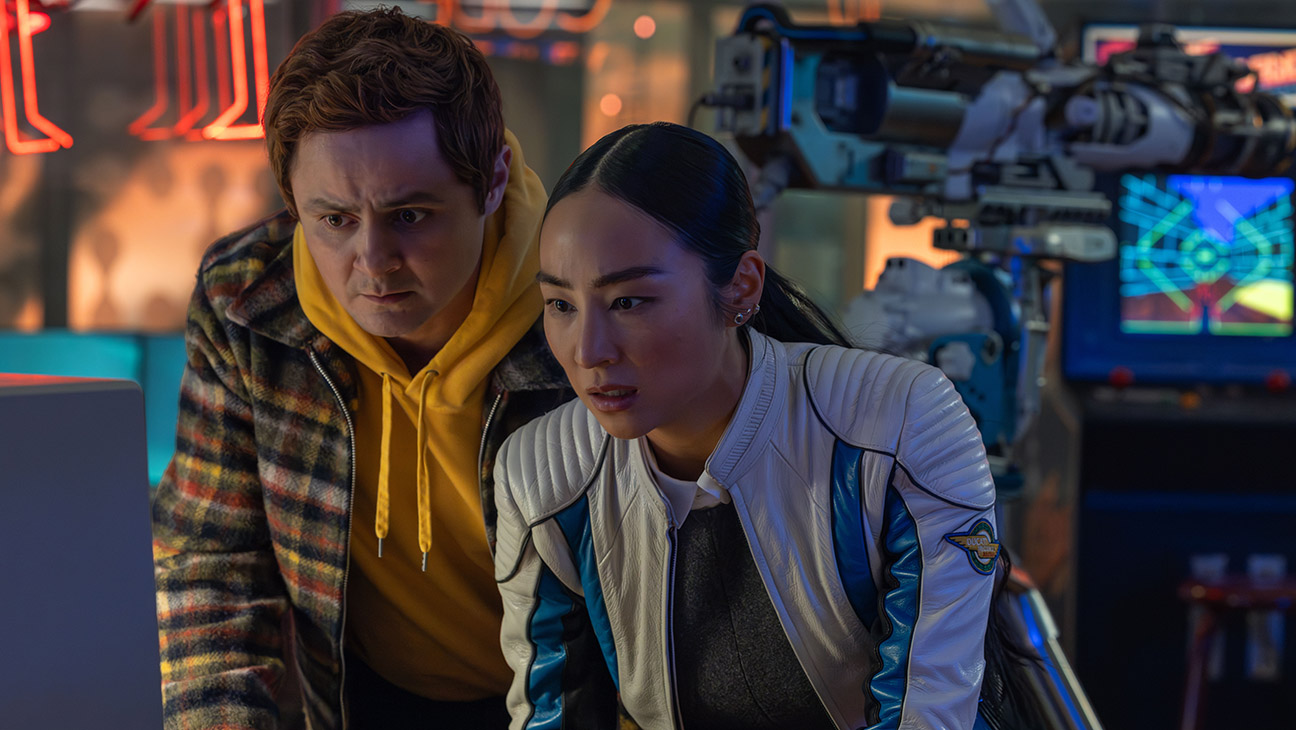
The aforementioned strike put Tron: Ares in a very precarious spot, but production was finally able to start in early 2024. You weren’t a part of the pre-strike cast?
Yeah, that’s another one of those moments of extreme gratitude. They already had the cast, and I was able to join because of scheduling conflicts after the strikes. I’d done RoadHouse already, and Jared Leto and Jake Gyllenhaal share an agent, Brent Morley. So he went to Jared and said, “Check out this trailer for Road House. I think you guys will want to see this guy.” And it meant the world to me for various reasons. He had nothing to gain from it, honestly. I was already at William Morris, and he’s not my agent. But he saw somebody that worked really hard to make an impression on Road House, and he thought it was worth giving me a shot. So that’s what kicked off the real gratitude moment of me entering Tron and feeling like it was serendipitous.
I treated every day on set as if it was the greatest possible gift. Pre-pandemic and pre-strike, I know that my attitude would have been like, “Well, this is cool. Great set. Anyway, let’s move on.” But with Tron, I was just like, “Man, screw it. Who is going to care if I’m really excited? This is incredible. I can’t believe you built this set. How did you do this?” I felt like a 1920s newsboy. I was like, “We’re in Tron, everybody! Have you heard!? We’re in Tron!” And they’re like, “Yeah, we heard. We hired you.” (Laughs.) So the serendipity of that moment added to my level of gratitude to be on the project.
Have you worked with many method actors over the years? Or was Jared the exception?
I’ve worked with at least a couple over the years, and from the first one, I realized that I had misconceptions about what it was. I thought that you had to subscribe to their process in a way, and I realized, as far as Jared is concerned, that he’s not imposing his process on you. He decides to stay in character and be referred to as his character, and it’s just part of his process in a very non-intrusive way. So I’ve found that, more often than not, there’s nothing different about working with method actors than anybody else who takes their job seriously. So I admire that, and while it’s not my process, I always find it fun to see how it manifests.
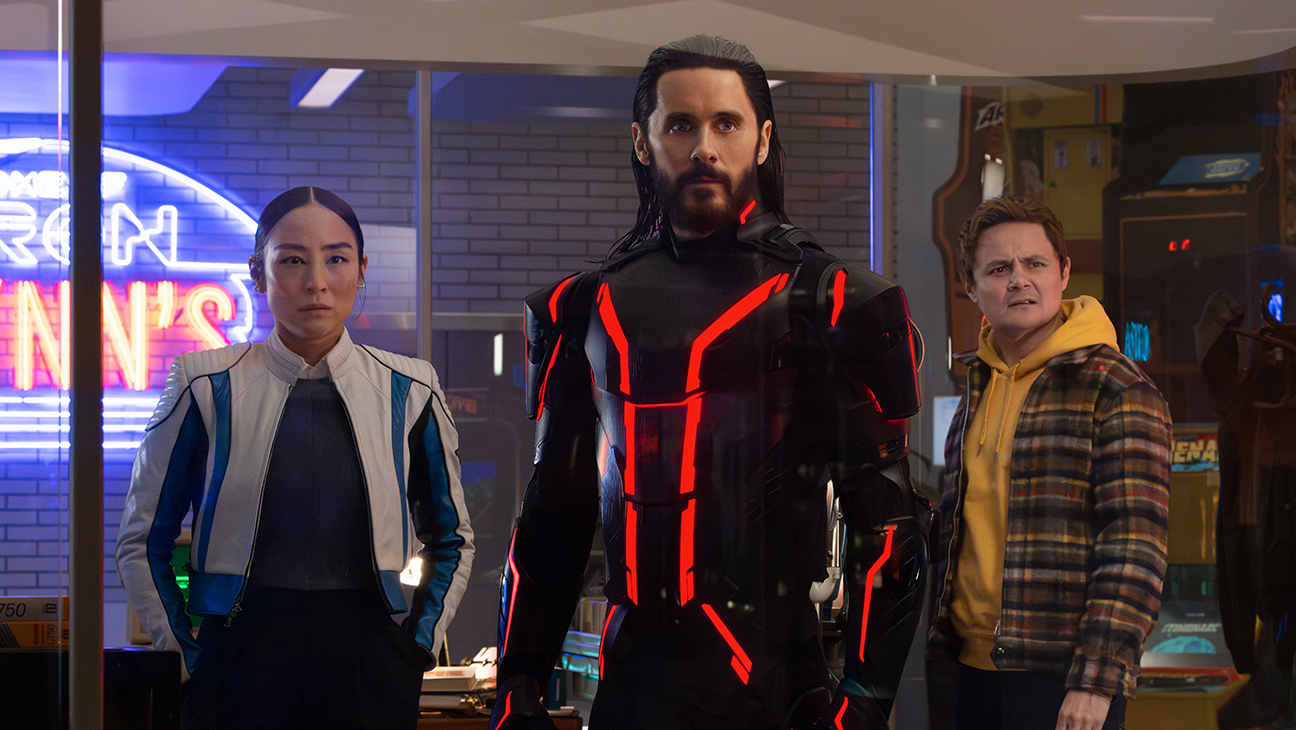
The best joke in the movie is when you, as Seth, apologize to Ares (Leto) for the comment about his “ancestors.”
That might’ve been my only improv line that I managed to get in there. The script was so good and so tight. But I just couldn’t believe that line made it into the movie. Greta Lee told me ahead of time. She saw it before I did, and I was so stoked.
You have a sequence set inside an office museum of sorts for Jeff Bridges’ character, Kevin Flynn. Did you ever cross paths with Jeff at all off set?
Yeah, I just went to meet him because he’s The Dude. I’ve admired his work for so long. Jeff always seems like he’s just got done with the most satisfying swim in the ocean. Or it’s like he’s just descended from a hammock. He has this wonderful, relaxed energy that is so different from my bouncing-off-the-wall energy. The guy that gave me my first break was Ben Gazzara, and he played Jackie Treehorn in The Big Lebowski. So I was so looking forward to meeting him to share stories about Ben.
Did the original Tron movie ever reach you in Guatemala?
It obviously came out before my time, but I’m a huge arcade geek, man. I’ve been a gamer my entire life, so Tron has been in my periphery my entire life. So I might’ve been nine or ten years old when I first watched it, and I thought it was so cool.
I then got to work with Garrett Hedlund on an Ang Lee movie [Billy Lynn’s Long Halftime Walk], and he told me about [his time on] Tron: Legacy. I am also a huge Daft Punk fan. So I have always been so impressed and stoked about this world. My imagination has always been so overactive, and I get so immersed in this visceral, vivid world. So I couldn’t believe that I got to be in this new one.
I didn’t know anybody when I moved here from Guatemala. My English was good, but I had a thick accent. And the only thing that kept me going for many years was this feeling that moments like this existed. So being at the premiere with my fiancée and my mom was the physical manifestation of those dreams coming true. It’s really surreal, man.
If Disney couldn’t coax Daft Punk out of retirement, then Nine Inch Nails is quite literally the next best option. When in the process did you find out they were scoring the film?
I believe it was halfway through filming. [Producer] Justin Springer told me about it, and I freaked out. I’m such a fan of Nine Inch Nails as a band and also of [Trent] Reznor and [Atticus] Ross’ scoring since The Social Network. So it was one of those moments where you’re at crafty and you’re already shooting the movie of your dreams, and then somebody comes to tell you that the Tooth Fairy does exist.
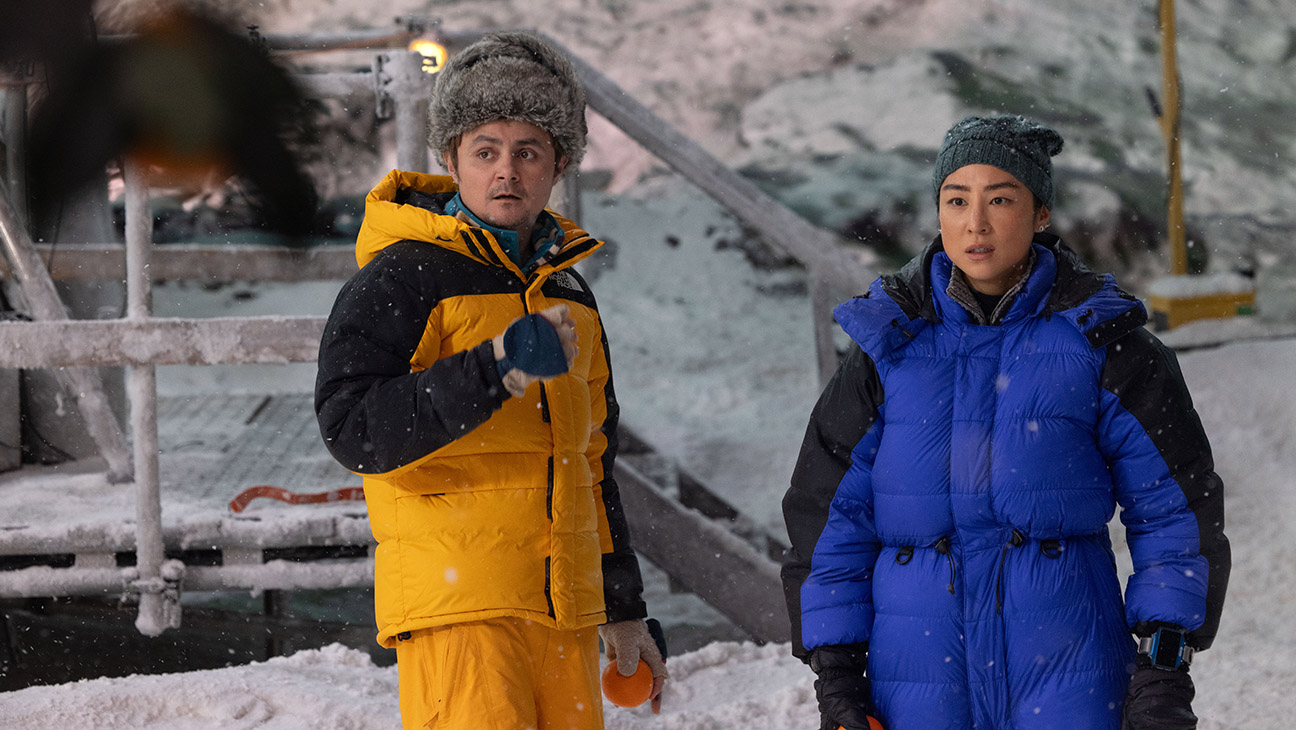
Tron: Ares is about the upside and downside of AI, so do you think our present-day civilization can wield this tool responsibly?
I think technology is neither bad nor good; it’s just the way you use it. I did a couple episodes of Silicon Valley, and those guys told me some stories. They said that these guys from the actual place would come up to them and be like, “Oh my God, I just created this crazy facial recognition software that can see you from anywhere.” And when they would then ask, “Okay, but what if it’s used for nefarious purposes?” they could apparently see in their faces that it never occurred to them.
So there’s a risk in assuming that there’s somebody guarding the gates and that the technology will only go so far. I keep hearing, “Well, they’ll never let that happen,” but I’m like, “Who’s they?” It’s up to us as moral or, at least, thoughtful beings to keep in mind that this technology needs safeguards. It could be used to bring benefits and advance fields like medicine, but we need to assume that people will use it irresponsibly. Otherwise, I just don’t see it ever ending in a positive way for humankind when we’re building it at such a breakneck speed.
Besides Tron, the reason why I wanted to do this interview is because of Joe Gordon Levitt’s show, Mr. Corman. I really liked your character on that show as well as your showcase episode. Was that a meaningful experience despite being just one season?
Oh, it was the most meaningful experience. That show took me out of the pandemic. We started shooting it in L.A. before the shutdown, and then Joe called me one day and was like, “Hey, we can keep shooting this in New Zealand.” I got to play a three-dimensional character in Victor Morales on this really well-written show opposite this really wonderful human being in Joe. I also got to take a break from the year-long stress of the pandemic by being in such a beautiful place like New Zealand. One of the first things I did after quarantine was go to a concert with 35,000 people, and while it’s hard to grasp what that means now, it was like stepping into a different world at the time.
So that role will always, always mean something to me. There’s obviously a pain that comes with the fact that it didn’t get more eyes on it, but God, I’ve learned to release the result as an actor and as an artist. What I take with me are the memories and the lessons, and that was a pivotal one for me. So thank you for watching it, man. I’m always stoked when I meet somebody that watched Mr. Corman. Honestly, it means the world to me.
Before you were turned into a human s’more, how much investigation was there into what Ralph Fiennes whispered in Nick Hoult’s ear on the set of The Menu?[Writer’s Note: Castro played one of the bread-obsessed tech bros.]
Oh, man. I was very curious, but Nick never told any of us what Ralph whispered. Apparently, it was different every time. The beauty about that movie was that even on the days you didn’t have lines, you were still in the restaurant. So I got a front row seat to watch Ralph and John Leguizamo and Nick and all these incredible actors do their thing. There’s a part where John’s character stands up to try to defend us all [to Ralph’s character], and it goes horribly wrong. So they did a couple takes, and then they started improvising at each other two feet away from me. If you had told me during acting school back in 2006 that I was going to get the chance to watch these two guys go at it, I wouldn’t have believed you.
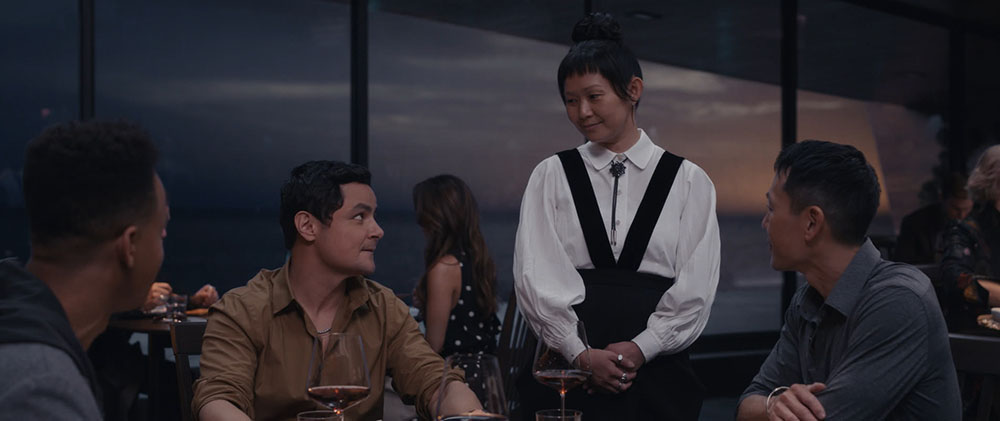
I’ve seen every Narcos series there is to see. Those shows dramatized real events, certainly, but they also strived for authenticity when possible by filming at some of the real-life locations. Was it ever eerie to know that you were retracing the steps of such harrowing events?
Hugely. We filmed at this mansion that we thought was standing in for Pacho Herrera’s mansion, and the director was like, “Yeah, this is his actual mansion. The government confiscated it, and we’re renting it to shoot in it.” That put us right there in terms of authenticity.
There’s a piece of my innocence that I’ll never get back from researching people in the Cali Cartel. I would watch footage of sicarios saying that they killed somebody, and they would say it with the same ease as if they told you that they took a shower. But if the audience gives you their time and their money to watch you in a theater or through a streaming subscription, the least that you owe them is to leave a little blood in the water. So I’m okay with a little piece of my innocence never coming back to me because I got to share this cautionary tale.
I didn’t see Narcos as glorifying drug dealing. Being a Latino, that was the moral question I had for myself. And, to me, by showing these people as they were, it takes away the luster. None of them wind up well. Everybody winds up dead or in jail or somehow worse. So it was definitely harrowing at times, but that shoot was also one of the best experiences of my life. I got to speak Spanish for the first time in so long, and the entire cast was very fatherly towards me for eight months in Colombia. I lost my father when I was 17, and to spend time with these older Latino male father figures who were also into art and acting and the beauty of theater, it was incredibly meaningful to me.
I do love that your take on Pablo Escobar in Weird: The Al Yankovic Story gave you a completely opposite tonal companion.
(Laughs.) I love parodying that culture. In the same way that Narcos’ cautionary tale took away the luster, parodying it also takes away any luster from it. I’ve been a huge fan of Weird Al Yankovic my entire life. But, God, to be able to play a Pablo Escobar who was just petty and wanted friends, there was something so stupid and so hilarious about that to me. So I jumped at the chance, and it premiered at TIFF within two days of The Menu. You can imagine what that experience was like for me.
The trailer you referenced earlier features it, but I think the best scene in Road House is that opening slapping fight. Was Doug Liman as advertised?
Man, it was so cool once I learned the language of his shooting style. He doesn’t use a shot list. He’s really a genius. He just picks the shot [on the day] and knows exactly what he wants. He also cares so much about what’s happening in the background. That’s how authentic he is. But I was very lucky in the sense that they wrote me into another scene after the table read.
By the time I got to set, I just felt from Doug that I was able to improv or add as much or as little as I wanted. I thought it was going to be a more color-within-the-lines set, and I wasn’t expecting to have that freedom. It was then fun to see that the character really resonated. I love being a character that’s the audience’s perspective and has to answer questions honestly no matter what you ask him. I love being a character who has really petty needs in a heightened situation. So I’m really lucky that Doug let me run away with a character who just wanted to join a motorcycle club.
When I premiered The Menu and Weird at TIFF, I was shooting Road House, so I got to go back to the Dominican Republic afterwards. That was an awesome couple of months.
You’ve got some cool work coming up with Sam Hargrave’s Matchbox, Chloe Domont’s A Place in Hell and BenDavid Grabinski’s Mike & Nick & Nick & Alice. How would you sum up those experiences?
Man, Matchbox is incredibly close to my heart. I got engaged during that shoot.
Congrats.
Thank you. The Matchbox cast and I were rehearsing in Budapest for one of the scenes. We were all on the floor of a carpeted office, and we were pretending to be in this massive vehicle during a precarious situation. And Jessica Biel turned to all of us and said, “Can you guys believe that this is our job? Can you believe that we do this for a living?” And I was like, “You’ve been doing this as long as you have, and you still have that wonder?” So that’s the type of people I want to be with on set. Everybody on Matchbox was really alley-ooping each other for the best line and the best punchline.
With Chloe Domont, I never thought I’d be in such a cool prestige project so soon. As dramatic and intense as [A Place in Hell] is, it also has a lot of humor. The way she’s able to weave genres was something I’ve never seen before. And talk about having a front row seat, I got to have scenes with Daisy Edgar-Jones and Michelle Williams at the same time. It was an out-of-body experience, and I was like, “Oh, shit. I should say my line now.” I got caught up in watching these people.
BenDavid Grabinski has also become a great friend, and his movie, Mike & Nick & Nick & Alice was honestly one of the funniest scripts I’ve ever read. It’s the same with El Tigre and Tom Segura. Tom is one of the most genuine, caring human beings I’ve ever met, and he’s also incredibly hilarious.
So I know that I keep saying this and that it sounds cliché, but it’s not a canned answer. These five projects, starting with Tron, were all amazing experiences in a variety of genres, and I just can’t believe that it’s happening to me, man. I feel like my chest is going to explode from gratitude. It makes me emotional, honestly.
What’s the most impactful note you’ve received from a director?
Ang Lee once said, “Arturo, less love, more volume.”
What do you think he meant by that?
I still don’t know to this day. (Laughs.) God, I remember another note, but I forget who it was that told me this. I tend to associate being natural with very free body movement, and my center of gravity is kind of bouncy. So it might’ve been in theater, but a director was like, “What if you allowed your body to be still? See where that energy transfers to once you’re not letting it go with all this movement.”
And what I realized is that for characters who are really passionate about what they’re saying, it gives you such power to not give that energy away, physically. You just plant yourself and speak your truth in the moment. So that director’s note changed my life, and it changed the way I approach acting. Whether it’s a comedy or a drama, I ask myself, “Where is this character’s power coming from?”
Out of all the philosophical notes I’ve ever received, I love that this one is a very practical, physical thing that I can hold onto when I’m trying not to get too caught up in the weeds of the why and the obstacle. So that note that a director gave me about my physicality really changed the game for me.
The podcast market is so saturated that it’s wise to do something niche, and your podcast, Greatest Escapes, is certainly that. Is it coming back at a certain point?
Yes, I’m elated that we just got nominated for a Signal Award [Most Innovative Audio Experience]. FilmNation came to me and asked, “Would you ever consider exploring this space?” And I just love history. I love little moments in history that affect bigger moments down the line. One such example is how cheap bananas almost ended the world. So I jumped at the chance to tell my friends about these types of moments on a podcast. We’re coming back with even more exciting guests, and we’re going to look at the stupidity throughout history. There will hopefully be some good lessons on how not to repeat it.
***
Tron: Ares is now playing in movie theaters nationwide.

